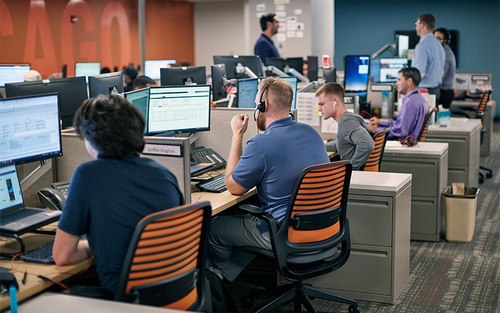As the transportation industry grows and evolves, freight brokers and third-party logistics (3PL) providers are increasing in popularity. Schneider’s 3PL division is our fastest growing line of business and is hiring freight brokers to execute operational excellence and load carriers’ trucks for profit day-over-day.
Good freight brokers can work in a fast-paced work environment, enjoy multi-tasking and are problem solvers. To be a truly great freight broker, though, you must go above and beyond developing those characteristics.
As someone who works closely with 3PL, here are my six tips on how to be a successful freight broker.
Tip 1: Go with the flow
In the transportation industry, things go wrong frequently – traffic delays, inclement weather, truck breakdowns, etc. (I could write a blog about all the things that can go wrong while a truck is in transit.)
To be a successful freight broker, you can’t stress about the things you can’t control. When an issue arises, act quickly, solve what you can and communicate your solution with all impacted parties.
Tip 2: Use proactive communication
As a freight broker, you are in charge of the service of that load. It is critical to stay in contact with your carrier and provide your customer with timely status updates.
To be proactive and prevent service issues, check in with your carrier for updates and ETAs. (See Tip 5 for more insight.)
Tip 3: Be a market guru
It is vital to know the market and your lanes. If you don’t know the market’s characteristics, you won’t be able to properly negotiate.
For example, if you start negotiations low on a load where there is limited capacity, you may be automatically pricing yourself out. This is why it’s important to know the market.
Things to consider when trying to understand your market could include truck availability, weather, seasonal shipping and lane history.
Tip 4: Be ready to negotiate
To be a successful freight broker, you must master Tip 3 before you can execute on Tip 4.
Negotiation is key. To become a high-earning freight broker who makes six figures a year, you need to be a strategic negotiator. This means sounding confident, knowing the characteristics of your load (weight, transit time, commodity, etc), having your counter offer ready and being prepared to hear “no” – the load, lane or price won’t be right for everyone.
Tip 5: Grow strong carrier relationships
Get to know your carrier and let them know you want to load their truck! Learn the lanes your carrier traditionally runs and the load characteristics they prefer. Having a large carrier base allows you to strategically align your freight with the right carrier fit.
Tip 6: Invest in the right technology
Use technology that supports you and your carriers. Automate what you can to focus more on your book of business and grow carrier relationships.
An example of value-added tech for freight brokers is Trucker Tools. In 2019, Schneider freight brokers started leveraging Trucker Tools. The application offers a better carrier experience and gives Schneider better visibility of loads in transit.






